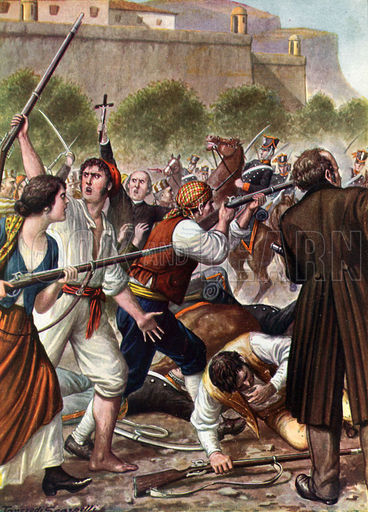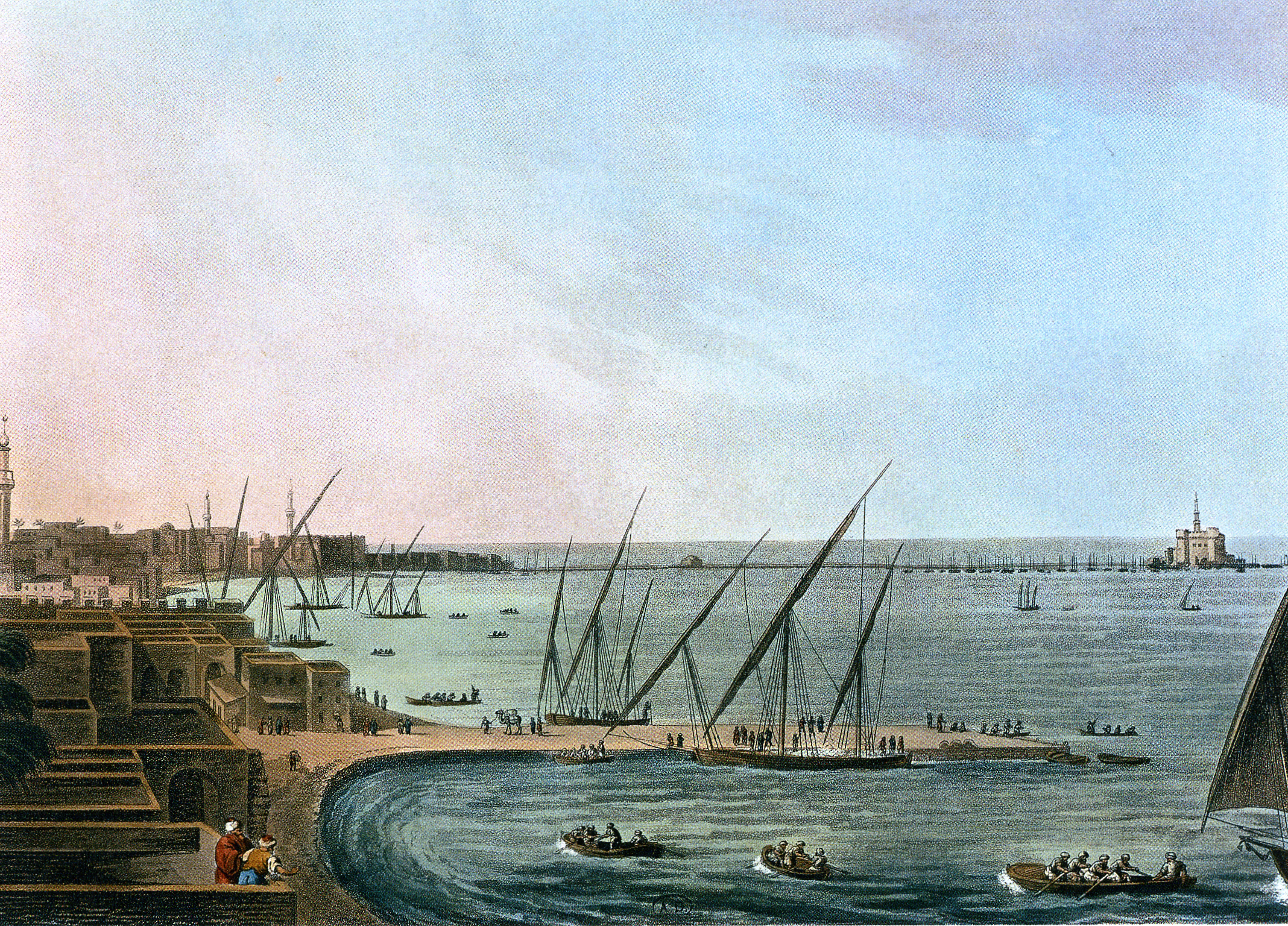|
Greek War Of Independence
The Greek War of Independence, also known as the Greek Revolution or the Greek Revolution of 1821, was a successful war of independence by Greek revolutionaries against the Ottoman Empire between 1821 and 1829. In 1826, the Greeks were assisted by the British Empire, Bourbon Restoration in France, Kingdom of France, and the Russian Empire, while the Ottomans were aided by their vassals, especially by the Eyalet of Egypt. The war led to the formation of modern Greece, which would be expanded to its modern size in later years. The revolution is celebrated by Greek diaspora, Greeks around the world as Greek Independence Day, independence day on 25 March. All Greek territory, except the Ionian Islands, the Mani Peninsula, and mountainous regions in Epirus, came under Ottoman rule in the 15th century. During the following centuries, there were Ottoman Greece#Uprisings before 1821, Greek uprisings against Ottoman rule. Most uprisings began in the independent Greek realm of the Mani Pe ... [...More Info...] [...Related Items...] OR: [Wikipedia] [Google] [Baidu] |
Revolutions During The 1820s
Revolutions during the 1820s included revolutions in Russia ( Decembrist revolt), Spain, Portugal, and the Italian states for constitutional monarchies, and for independence from Ottoman rule in Greece. Unlike the revolutionary wave in the 1830s, these tended to take place in the peripheries of Europe. Timeline * 1820: The Trienio Liberal in Spain * 1820: the Liberal Revolution in Portugal * 1820: the Kingdom of the Two Sicilies * 18211829: Greek War of Independence * 1821: the Kingdom of Sardinia * 1825: the Decembrist revolt in Russia * 1828: the Decembrist revolution in Argentina Europe Italy The 1820 revolution began in Sicily and in Naples, against King Ferdinand I of the Two Sicilies, who was forced to make concessions and promise a constitutional monarchy. This success inspired Carbonari in the north of Italy to revolt too. In 1821, the Kingdom of Sardinia (Piedmont) forced King Victor Emmanuel I to abdicate and temporarily obtained a constitutional monarchy as ... [...More Info...] [...Related Items...] OR: [Wikipedia] [Google] [Baidu] |
Egypt Eyalet
Ottoman Egypt was an administrative division of the Ottoman Empire after the Ottoman–Mamluk War (1516–1517), conquest of Mamluk Egypt by the Ottomans in 1517. The Ottomans administered Egypt as a Eyalet, province (''eyalet'') of their empire (). It remained formally an Ottoman province until 1914, though in practice it became increasingly autonomous during the 19th century and was under de facto British Empire, British control from 1882. Egypt always proved a difficult province for the List of sultans of the Ottoman Empire, Ottoman Sultans to control, due in part to the continuing power and influence of the Mamluks, the Egyptian military caste who had ruled the country for centuries. As such, Egypt remained semi-autonomous under the Mamluks until Napoleon Bonaparte's French First Republic, French forces invaded in 1798. After Anglo-Turkish forces expelled the French in 1801, Muhammad Ali of Egypt, Muhammad Ali Pasha, an Albanian military commander of the Ottoman army in Egyp ... [...More Info...] [...Related Items...] OR: [Wikipedia] [Google] [Baidu] |
Carbonari
The Carbonari () was an informal network of Secret society, secret revolutionary societies active in Italy from about 1800 to 1831. The Carbonari may have further influenced other revolutionary groups in France, Portugal, Spain, Brazil, Uruguay, the Ottoman Empire, and Russia. Although their goals often had a Patriotism, patriotic and Liberalism, liberal basis, they lacked a clear immediate political agenda. They were a focus for those unhappy with the repressive political situation in Italy following 1815, especially in the south of the Italian peninsula. Members of the Carbonari, and those influenced by them, took part in important events in the process of Unification of Italy, Italian unification (called the ''Risorgimento''), especially the failed Revolutions of 1820, Revolution of 1820, and in the further development of Italian nationalism. The chief purpose was to defeat tyranny and establish a constitutional government. In the north of Italy, other groups, such as the Ade ... [...More Info...] [...Related Items...] OR: [Wikipedia] [Google] [Baidu] |
Philhellenism
Philhellenism ("the love of Greek culture") was an intellectual movement prominent mostly at the turn of the 19th century. It contributed to the sentiments that led Europeans such as Lord Byron, Charles Nicolas Fabvier and Richard Church to advocate for Greek independence from the Ottoman Empire. The later 19th-century European philhellenism was largely to be found among the Classicists. The study of it falls under Classical Reception Studies and is a continuation of the Classical tradition. Antiquity In antiquity, the term ''philhellene'' ("the admirer of Greeks and everything Greek"), from the (, from ''φίλος'' - ''philos'', "friend", "lover" + ''Ἕλλην'' - ''Hellen'', "Greek") was used to describe both non-Greeks who were fond of ancient Greek culture and Greeks who patriotically upheld their culture. The Liddell-Scott Greek-English Lexicon defines 'philhellene' as "fond of the Hellenes, mostly of foreign princes, as Amasis; of Parthian kings .. also of He ... [...More Info...] [...Related Items...] OR: [Wikipedia] [Google] [Baidu] |
Areopagus Of Eastern Continental Greece
The Areopagus of Eastern Continental Greece () was a provisional regime that existed in eastern Central Greece during the Greek War of Independence. Background During the first stages of the Greek Revolution against the Ottoman Empire, there existed no overall authority over the rebels. Each region separately elected its own assemblies and tried to put together an administration to coordinate the struggle. One of the first such entities was established in eastern continental Greece (" Roumeli"). History The uprising began in March, and established itself with the capture of the provincial capital, Salona (modern Amfissa), on 27 March 1821. The Ottoman garrison held out in the citadel until April 10, when the Greeks took it. At the same time, the Greeks suffered a defeat at the Battle of Alamana against the army of Omer Vryonis, which resulted in the death of Athanasios Diakos. But the Ottoman advance was stopped at the inn of Gravia, under the leadership of Odysseas Andr ... [...More Info...] [...Related Items...] OR: [Wikipedia] [Google] [Baidu] |
Senate Of Western Continental Greece
The Senate of Western Continental Greece () was a provisional regime that existed in western Central Greece during the early stages of the Greek War of Independence The Greek War of Independence, also known as the Greek Revolution or the Greek Revolution of 1821, was a successful war of independence by Greek revolutionaries against the Ottoman Empire between 1821 and 1829. In 1826, the Greeks were assisted .... History The western part of Central Greece had rebelled against Ottoman rule in spring 1821, along with the rest of southern Greece. In order to organize the administration of the region, an assembly was to be convened at Vrachori on 1 October, but it was eventually postponed for 4–9 November 1821, at Missolonghi. The assembly included 30 representatives from the region and voted for the creation of a constitutional charter (Οργανισμός Δυτικής Χέρσου Ελλάδος) that provided for the creation of a ten-member Senate to administer the af ... [...More Info...] [...Related Items...] OR: [Wikipedia] [Google] [Baidu] |
Peloponnesian Senate
The Senate of the entire People of the Peloponnese provinces (), commonly known as the Peloponnesian Senate (), was a provisional regime that existed in the Peloponnese during the early stages of the Greek War of Independence. History On 25 March 1821 (all the dates are given according to the Julian calendar), a few days after the outbreak of the Greek War of Independence in March 1821, the rebels of the southern Peloponnese, led by the Maniots, assembled at Kalamata and founded the Greek rebels' first organ of government, the Messenian Senate. As the uprising spread through Greece, the Messenian Senate's leader, Petrobey Mavromichalis, invited representatives from the rest of the Peloponnese in an assembly held at the Kaltetza Monastery. There, on 26 May the "Senate of the entire People of the Peloponnese provinces", commonly known, from the legend on its seal, as the "Peloponnesian Senate" and as the "Senate of Kaltetza" (Γερουσία των Καλτετζών), was found ... [...More Info...] [...Related Items...] OR: [Wikipedia] [Google] [Baidu] |
Messenian Senate
The Messenian Senate () was the first government of the Greek Revolution. It was the first move towards the creation of the Peloponnesian Senate. History The Messenian Senate was formed at Kalamata on 25 March ( O.S.) 1821. During its inaugural session, it elected Petrobey Mavromichalis as its president. Three days later the Senate issued a ''Manifesto Addressed to Europe'', ''“the first formal briefing (“warning”, as the manifesto was characterised by its writers) of the European governments and European public opinion about the declaration of war to Turkey by the Greeks”''. In the following months, the Manifesto (probably written by Adamantios Korais) was delivered to the European consulates in Patras and appeared in Italian, French, English, German and American newspapers. The Messenian Senate was dissolved after the formation of the Peloponnesian Senate The Senate of the entire People of the Peloponnese provinces (), commonly known as the Peloponnesian Senate () ... [...More Info...] [...Related Items...] OR: [Wikipedia] [Google] [Baidu] |
Armatoloi
The armatoles (; ; ; ), or armatole in singular, were irregular soldiers, or militia, commissioned by the Ottoman Empire, Ottomans to enforce the sultan's authority within an administrative district called an armatoliki ( in singular, , in plural). In Ottoman Greece, Greek regions of the Ottoman Empire, they were composed of Greeks who were either former klephts or village stalwarts who had taken up arms against the klephts in the defense of their district. The Greek armatoles had a semi-independent status all over the Greek peninsula, and armatolikia were created in areas that had high levels of brigandage (i.e. klephts), or in regions that were difficult for Ottoman authorities to govern due to the inaccessible terrain, such as the Agrafa mountains of Thessaly, where the first armatoliki was established in the 15th century. Over time, the roles of the armatoles and klephtes became blurred, with both reversing their roles and allegiances as the situation demanded, all the while ... [...More Info...] [...Related Items...] OR: [Wikipedia] [Google] [Baidu] |
Klephts
Klephts (; Greek κλέφτης, ''kléftis'', pl. κλέφτες, ''kléftes'', which means "thieves" and perhaps originally meant just "brigand": "Other Greeks, taking to the mountains, became unofficial, self-appointed armatoles and were known as klephts (from the Greek ''kleptes'', "brigand").") were highwaymen turned self-appointed armatoloi, anti-Ottoman insurgents, and warlike mountain-folk who lived in the countryside when Greece was a part of the Ottoman Empire. They were the descendants of Greeks who retreated into the mountains during the 15th century in order to avoid Ottoman rule.: "The klephts were descendants of Greeks who fled into the mountains to avoid the Turks in the fifteenth century and who remained active as brigands into the nineteenth century." Klepht bands also included many ethnic Albanians. They carried on a continuous war against Ottoman rule and remained active as brigands until the 19th century. The terms kleptomania and kleptocracy are derived fro ... [...More Info...] [...Related Items...] OR: [Wikipedia] [Google] [Baidu] |
Greeks
Greeks or Hellenes (; , ) are an ethnic group and nation native to Greece, Greek Cypriots, Cyprus, Greeks in Albania, southern Albania, Greeks in Turkey#History, Anatolia, parts of Greeks in Italy, Italy and Egyptian Greeks, Egypt, and to a lesser extent, other countries surrounding the Eastern Mediterranean and Black Sea. They also form a significant Greek diaspora, diaspora (), with many Greek communities established around the world.. Greek colonies and communities have been historically established on the shores of the Mediterranean Sea and Black Sea, but the Greek people themselves have always been centered on the Aegean Sea, Aegean and Ionian Sea, Ionian seas, where the Greek language has been spoken since the Bronze Age.. Until the early 20th century, Greeks were distributed between the Greek peninsula, the western coast of Asia Minor, the Black Sea coast, Cappadocia in central Anatolia, Egypt, the Balkans, Cyprus, and Constantinople. Many of these regions coincided to ... [...More Info...] [...Related Items...] OR: [Wikipedia] [Google] [Baidu] |






